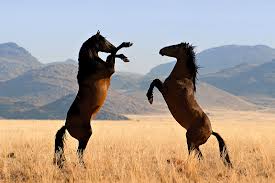 The rounding up and penning of wild horses in western states has gotten both a great deal of national news and personal Facebook postings of late. One of my good friends is an animal activist from Colorado and I’ve been reading about this activity, thanks to her links, for several years now. It seems to be finally getting some national attention as I spotted a lengthy story on the subject yesterday.
The rounding up and penning of wild horses in western states has gotten both a great deal of national news and personal Facebook postings of late. One of my good friends is an animal activist from Colorado and I’ve been reading about this activity, thanks to her links, for several years now. It seems to be finally getting some national attention as I spotted a lengthy story on the subject yesterday.
The reason I want to write about it today has to do with the complexities of the issue and the difficulties of finding solutions. Let me first describe the problem. Wild horses are not actually wild horses at all, they are feral horses. That’s not really pertinent to the issue but interesting nonetheless. These animals are the descendants of domesticated horses that escaped captivity long ago. In the western states there is a population estimated at about 82,000. Of these, 32,000 are free in the wild while another 50,000 are held in pens. These 50,000 horses were largely captured in annual roundups. According to the Bureau of Land Management’s (BLM) own statistics about 1% of all horses captured this way end up dying because of injuries sustained in the operation. One percent doesn’t seem like a lot but it’s a significant number. Many other horses are badly hurt being driven into barbed wire fences among other things.
After roundup the horses are offered for adoption but the number taken in has been dropping and those in captivity rising. Capture operations and ongoing housing and feeding costs an estimated $78 million dollars a year. The costs are rising as more animals are being held. That’s taxpayer money.
We’ve got animal cruelty and big expenses. So, why is it happening?
The western lands where the horses roam is also home to sheep and cattle ranches. These animals need the grass to breed and survive. The ranchers who own these animals depend on the land for their livelihoods.
Environmentalists and animal lovers want the animals to roam free. Ranchers want to kill them all. The roundup as it stands is a compromise solution but it’s beginning to fail. So, we need to figure out something else.
The biggest problem is the BLM refuses to sell the horses for slaughter. Animal activists regard such a solution for the horses as anathema. So, to appease the ranchers we keep rounding them up and to appease those who love the horses we don’t kill them.
I know I’m not going to be popular here but the fact is we need a hunting season on horses. Sell permits and let people go out there and shoot them. Horse meat largely isn’t eaten in the United States but it is elsewhere in the world and for good reason. It is lean, low-fat, high-protein meat. Yes, we love horses, yes we find watching them roam the western lands beautiful. Here’s the reality, if we’re willing to compromise we can have it all.
Hunt the horses to keep numbers at a level satisfactory to ranchers and activists. Eat the meat and enjoy it. Allow thousands of the animals to roam the western landscape for the enjoyment of endless generations to come. The horse lives a life free to roam until it is killed. That’s a good life, maybe not as long a life as they would have naturally but better than being in a pen.
The best solutions generally don’t make anyone perfectly happy. That’s often the sign of a good compromise.
As for me, I’m digging my bunker and getting my food and water supply ready for what will surely be an assault by my horse-loving Facebook friend!
Tom Liberman
Sword and Sorcery fantasy with a Libertarian Twist
Current Release: The Sword of Water (full-length fantasy fun for $2.99)
Next Release: The Spear of the Hunt